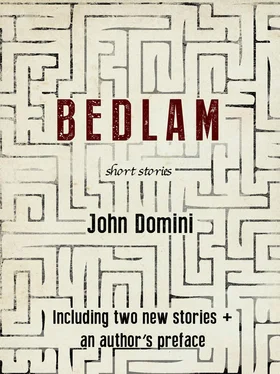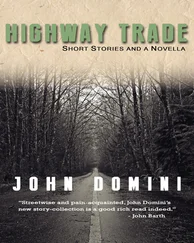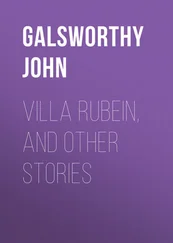So I screamed, I wept. It embarrasses me still to think of it. I ignored the little insults that would have stopped my tears in their tracks before this. I showed Ul ‘Lyu what feeling was.
And soon enough, sure enough, she was responding: “Ooo Baby Baby, I love you.”
I think I noticed in those very first words the falseness, the utter vacancy, of what she was saying.
“Ooo Bay-bay, yes I do.”
I couldn’t help but notice. She sounded exactly like one of those vapid soda-pop love songs I could remember from when I was last a teenager. I could almost hear the sappy strings, the faked echo effects.
“Ooo Baby, I love you-ooo too.”
But I wept on, drawing the promises out of her.
I should have realized what would happen. No insight, no matter how genuine, no trick no matter how devious, could have blocked every possible way I might lose her.
From some unmarked place high overhead, at some unmarked point in time, there arrived a dead population of singers. The music, however, was different from Ul ‘Lyu’s; it wasn’t accidental. In the shape of trumpets, more or less the consistency of brass, these new singers flew into the chalk-bright air of my adopted world. Around their distant bodies the sky became a mottled blue and green. I too was intrigued, during those brief moments before I realized the danger.
But then those trumpets began to play, then the bells of their horns grew and shrank according to the demands of their song…and then at once my Ul ‘Lyu began to respond. Of course I wouldn’t have minded if she’d merely wanted to talk. But something extra came into her electric hum, while the trumpets sang. I felt — oh, something extra. I felt the iron surfaces spreading once more against my palms, my fingers.
Ul ‘Lyu, trying to sing, went higher. The first time it happened, as she struggled for the tune, it became obvious that she would forget me if I let her. But, my bright bird, talented as you were, you couldn’t master the art right off. I did manage to survive pass after pass of these visiting trumpets. I did get to see how, below us, the buttes and canyons would shrink to no more than wrinkles in the white sheetrock, marked from end to end by the irregular intervals of five grouped lines. Against them, our shadows were dots.
For the music was different from Ul ‘Lyu’s. In order to play with this new kind — in order, it seemed, to communicate at all — she had to work. Ul ‘Lyu began by simply trying the melody. Then since the trumpet-people seemed uninterested, my lover turned to harmony, to counterpoint, or to adding a baroque, quasi-woodwind flourish. Yes, of course I took note of every least modulation. I was desperate for any chance at regaining her. And very pretty, Ul ‘Lyu, your work was very pretty. With each additional music lesson you put a new crack in my heart. Moreover the trumpets, also, must have liked something of what they heard, because they returned for pass after pass. At the edge of her sky, the brass ghosts would swivel like snakes and come back for another attempt at the combined symphony. And the more my lover tried to round out the score, the more metal she became.
Ul ‘Lyu, Ul ‘Lyu. I…
I don’t like to think, now, of the humiliations I went through to get her attention. Maybe the Powers on my world, inside their shuttered stalls, can identify gradations of pain. For myself, however, there is only a single, seamless ball-bearing of shame that rattles up and down the spine as I recall my excesses. I will admit I shouted till the muscles of my lungs were weary. I will admit that, with forced jealousy, I pointed out that the trumpet is considered a masculine instrument . Whenever I succeeded in tearing Ul ‘Lyu away from her music there followed pitiful bawlings of “true love, Ul ‘Lyu, true love.” And there are tricks even a cripple can do. By the end I was injuring myself deliberately. I kicked my feet bloody, against the metal that emerged while she tried to sing. Heaving myself up like a man pulling himself onto a tree branch, I cut my forehead open. I could even bash my nose against her iron self, until I was swallowing blood and mucus.
But ah, untrue love. Yes I might as well have brought out a couple of clowns, with feet like a duck and triangular purple eyes, one playing a weepy violin and the other a cracked accordion. Because Ul ‘Lyu, I led you on. I never for a moment tried to damage my hands or arms. I kicked and flopped and shook, but I never risked losing my grip.
At last, however, I played the wrong trick.
“ Ul ‘Lyu ,” I asked her at last, “what attracts you to them?” I lay on my belly, then, along the top of another harsh butte she hadn’t wanted to visit. “What, Ul ‘Lyu?” My face was buried in my arms. She floated overhead. I gasped unnecessarily. “They can’t give you what I can.”
“No, my Baby. No they can’t.”
But from the sound of her voice, I knew her face had rotated away from me.
“Tell me!” I snapped back my head and then brought it down onto the rock, hard enough to start tears. “Tell me!”
“I…Baby, I don’t know.”
Oh, but part of her did. Something in her voice drew my head up from my elbow again. Half-stunned and weeping, I could nonetheless see that her iron surfaces were already beginning to emerge as she answered my question.
“I don’t ever know,” she said in a heartbreakingly familiar way, “why I‘m up there singing.”
Ul ‘Lyu, Ul ‘Lyu.
I should have realized. It’s no excuse that I myself can’t sing, that I heard music but no other form of communication from the trumpets’ playing. No excuse, because after all this time I should have known that whenever my Ul ‘Lyu strove to imagine, to give voice, she was driven by the same essential mystery.
“Tell me,” I asked with more control, my false tears drying fast, “tell me what you sing about.”
“Oh Baby. Oh let me tell you….”
Who can say? maybe the trumpet souls had once lived on Ul ‘Lyu’s planet or moon or whatever, but through some small difference in world-view the brass kind had gone to their mottled afterlife and the iron ones had come here, to turn jelly and forget. But now as the trumpets had continued to pass overhead in one direction or another, here, my lover and I had begun to see some additional members alongside the distant formations. We’d begun to see those few other round fellow-creatures with whom Ul ‘Lyu had shared these ivory badlands. They had turned, yes, from jelly to metal. And now no sooner had my jungle child started to get excited at describing her songs than the whole weight of our difference crashed down between Ul ‘Lyu and me. Her kind had rediscovered its element. What I heard simply as the pleasant loudness of brass, she experienced . To her these high creatures sang the whole ferocious opera of sensuality she’d always spoken of and searched for. They made a world from pure voice. And what world? What sensations did they draw on? The same as ever, of course: the same familiar, physical universe that Ul ‘Lyu had shared with me from the first. The trumpets’ yell echoed off mundane surfaces. They could remake in sound the challenge in the size of a father’s hands, the fright that ices over the back of the neck when a grandmother presses her sagging face close for a kiss, the awkward presence of a wedding ring hidden in a coat pocket. Ah, and those were only the small fry, the low-voltage contact points. Because like Ul ‘Lyu these trumpets made no distinction between the commonplace and the devastating. Into their music they put both the dial-tone drabness of a workweek afternoon and the foot-soldier’s first ringing spasm of despair after a wound in the throat. These instruments in fact wanted the bells of their horns to tremble with any shock experience offered, at any moment they chose. They wanted song. That was their principle, and my Ul ‘Lyu’s forgotten principle: the music careening full-throated.
Читать дальше












